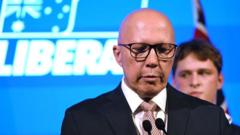Australia's political arena was dramatically reshaped after the Liberal Party suffered an unprecedented defeat in the recent federal election, which some analysts have labeled as its worst loss in history. The ramifications of this election are profound, particularly for party leader Peter Dutton, who not only failed to secure a win for his party but also lost his own seat in Dickson, a position he maintained for over 24 years.
The Labor Party's commanding victory highlights a significant shift towards a more unified message, as articulated by Prime Minister Anthony Albanese, who stated, "The Australian people voted for unity rather than division." The fallout for the Liberal Party has been severe, especially in major metropolitan areas such as Sydney, Melbourne, Brisbane, and Adelaide, where the party has seen substantial losses.
In response to this shocking outcome, some members of the Liberal Party are advocating for an in-depth review of their strategies and decisions, signaling a need for introspection. Keith Wolahan, a Liberal MP from Victoria, expressed the importance of addressing the issues that contributed to their defeat, emphasizing, “We have to listen to Australians. They have sent us a message.”
Amid the blame, some insiders have pointed to the influence of former President Donald Trump as a negative factor that impacted Dutton's campaign, drawing parallels between the two political figures. Former adviser Andrew Carswell pointedly remarked that "the Dutton experiment failed" and characterized the election loss as catastrophic for the Coalition.
This defeat has set in motion a leadership scramble within the Liberal Party. Prominent figures such as shadow treasurer Angus Taylor and deputy leader Sussan Ley are considered potential replacements. In the coming days, the party will need to regroup and strategize effectively to attract back the voters they have lost in what has proven to be a transformative electoral cycle for Australia.



















